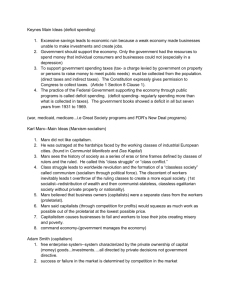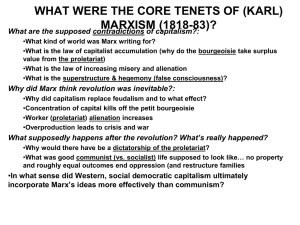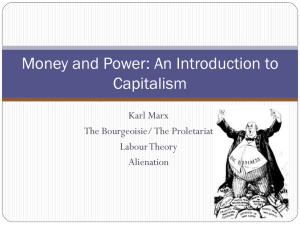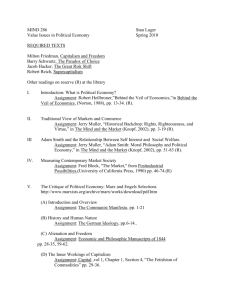Economics of Industrialization
advertisement
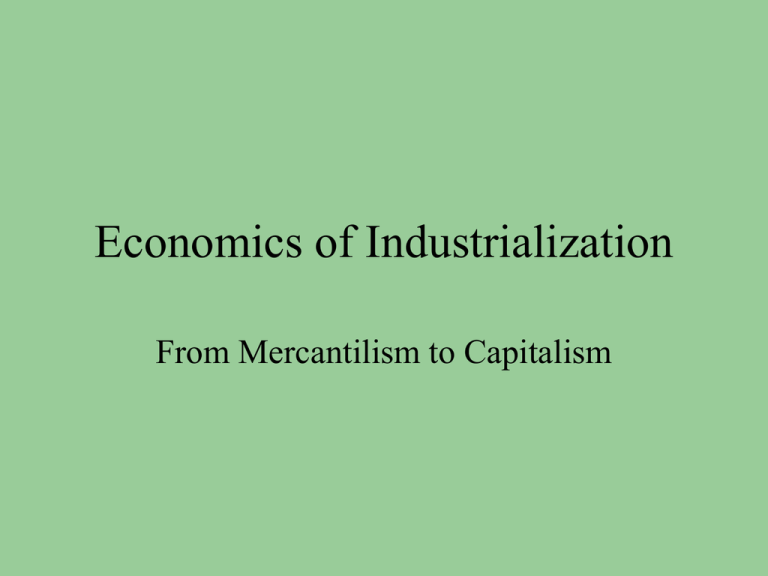
Economics of Industrialization From Mercantilism to Capitalism Mercantilism & Industrialization • Nations should maintain & increase their wealth by exporting more than they import • Governments regulate trade to make countries self-sufficient & keep prices stable • Industrial Revolution brings about the decline of Mercantilism: – More goods are produced – More money to be made Capitalism Emerges • People start to demand more & better goods • Merchants respond: – Invest in raw materials, pay cottage workers, sell at a profit – Invest their profits to build more factories, to hire more workers, who buy more goods, giving merchants more profits to invest….. Capitalism • ‘Free Market’ economy • No regulation of trade (vs. Mercantilism) • A system of production, distribution & exchange where: – Profit is invested for further profit – Workers are paid wages & compete for jobs – Control of the economy is PRIVATE Philosophy of Capitalism • An economic theory based on: – Natural forces of supply & demand – Free competition – Private ownership • Laissez-Faire – Government should not intervene in economy – Economy can take care of itself – Self-interest is good Capitalism & the Poor • Capitalism is great when you are making the profits, what about when you’re not? • Laissez-faire thinkers accept that there will be a permanent underclass • Laissez-faire thinkers oppose government help for workers because that would interrupt the natural forces of the free market Critics of Capitalism • Some people are concerned about the abject misery of the new working class • They think that the government should do something to help them & make working conditions better • Some of these critics come from the middle class, some come from the working class, some are philosophers… Utilitarians • Jeremy Bentham & John Stuart Mill • Need to judge things based on their usefulness • Government should promote the greatest good for the greatest number of people Mill’s Utilitarianism • Questions unregulated capitalism • Wants a more equal division of profits • Thinks government should do away with big inequalities in wealth • Calls for reforms: vote, legal system, prisons, education Socialists • Saint-Simon, Fourier, Owen • Government should offset the bad effects of industrialization • Government regulates the economy • Government should own factories • Goal of social justice Communists • Karl Marx (18181883) • Philosopher & Economist • Student of Hegel • Published: Das Kapital, Communist Manifesto • Lived in poverty in London, supported by Friedrich Engels Marx’s Critique of Capitalism • Based on humanism • Capitalism is fundamentally unfair: – some benefit at the expense of many – unequal distribution of wealth & goods • Marx says: – it is possible to have an industrial system that benefits everyone not just the owners – Laissez-faire government isn’t actually neutral, it is acting on the behalf of the capitalists Marx’s Theory of Class Struggle • All of human history is the history of class struggle – Worker vs. owner is just the most recent form of this struggle – In the past: peasant v. lord, slave v. master • Class conflict is inevitable & it is how history progresses Capitalist Class Relations • Under capitalism there are 2 classes: – Bourgeoisie: employers – Proletariat: workers • Proletariat is destined to organize and overthrow the Bourgeoisie Marx’s Theory of Alienation • Marx thought that labor is humans’ ‘life-activity’ • When you sell your labor, you sell your self • If labor is what make us uniquely human, then industrial work is dehumanizing • The more we produce, the less we have of ourselves, and the more the capitalists have Marx’s Theory of Exploitation • A worker’s labor power creates more value than the wage s/he gets in exchange for that labor. • Under capitalism, a surplus of value (profit) is taken from labor. • Marx says, even if you pay the workers more, improve their working conditions, & guarantee their rights, they are still exploited. • The only way to get rid of exploitation is to get rid of the wage relationship entirely. • Which brings us to…. Marx’s Theory of Communism • Capitalist class conflict leads to the Proletarian Revolution – Workers are tired of being exploited & feeling alienated – They organize & revolt against the capitalists • As a result of the Proletarian Revolution Capitalism gives way to Communism • Communist Utopia: – a classless society where no one wants for anything – everyone has equal say in all things Would you want to live in this society? “… nobody has one exclusive sphere of activity but each can become accomplished in any branch he wishes, society …makes it possible for me to do one thing today and another tomorrow, to hunt in the morning, fish in the afternoon, rear cattle in the evening, criticize after dinner, just as I have a mind, without ever becoming hunter, fisherman, shepherd or critic.” Oh, the irony of it all… • Capitalism creates its own downfall!!! • It creates the Proletariat & the Bourgeoisie • The Bourgeoisie exploits & alienates the Proletariat • Eventually, the Proletariat notice that they all share a common problem & revolt • They have ‘nothing to lose but their chains!’ Was Marx Right? • Well, time will tell, but in the short run…. • There may not have been a Proletarian Revolution in Britain, but • There was a great deal of Reform and social mobilization Labor Organization & Trade Unions • Workers worked long hours under dirty & dangerous conditions with the threat of being fired or laid off if they complained • Urbanization meant that people worked & lived together • They began to see that they had things in common as workers Workers Organize! • Trade unions were illegal in Britain until 1824 • After 1824 many unions were formed • By the 1870s workers won the right to strike • 1871: 290,000 union members • By 1901: 2,000,000 A Punch magazine cartoon from 1858 shows Father Thames with 'his offspring', diphtheria, scrofula and cholera. Trade Unions • Strength through unity permitted workers to demand reforms • Better pay & working conditions • Unions took care of their own: dues went to sick leave & strike pay Reform Movement • Trade Unions & middle class reformers pressure politicians to do something about working & living conditions • 1832 Reform Bill extends the vote to the middle class • Second Reform Act of 1867 gives all adult males the vote Political Pressure Works: • Factory Act of 1833 – Illegal to hire children under 9 – Kids 9 to 12 couldn’t work more than 8 hours/day – Kids 13 to 17 no more than 12 hours /day • 1842 Mines Act prevents women & children from working in the mines • Public Health Act of 1875 forces towns to: – pave, light & clean streets – appoint a Medical Officer of Health, Surveyor & Sanitary Inspector




